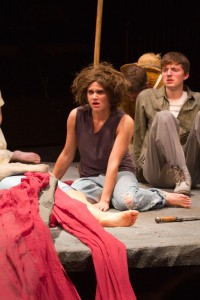It may be a Greek classic, but don’t expect any togas in this theater’s rendition of an ancient tale. Watch as the gods flaunt in their finest suits and the queen struts in stylish pumps. All things modern have transformed this nontraditional telling of “Electra.”

At 8 p.m. today, the Ithaca College Theatre will open the season with its modern rendition of Euripides’ “Electra.” Performances will be held in Clark Theatre and continue to show this weekend and Oct. 9.
Directed by Susannah Berryman, associate professor of theater arts, this Greek tragedy tells the story of Electra, whose pursuit of revenge after she is condemned to peasantry exposes the dynamics of human relationships. Written in 416 B.C., Berryman said the classical text has survived for a reason.
“The story that it offers to us is violence begets violence,” she said. “Despite our efforts over the ensuing centuries, we seem not to learn a lesson.”
Berryman chose Emily Townsend Vermeule’s translation of the play, which has modern quips, contemporary clothing and a symbolic setting, to focus on the ageless issue it presents.
“We’ve taken an eclectic route on the costuming and a more symbolic choice on the set because it’s no time and no place,” she said. “It’s every time and every place.”
No different from the days of Ancient Greece, the actors today use poetic dialect to tell the story and teach an age-old lesson.
Sophomore Richard Lindenfelzer, who plays the lead role of Orestes, spent a lot of time reading and rereading the words, working with the text to make the language sound real and organic.
“You have to invest in every word that comes out of your mouth,” he said. “Every word is chosen for a reason.”
Senior Morgan Lavenstein, who plays Greek princess Electra, said the colloquial references in the translation helped her tackle the script. She said she is acquainted with less refined roles, but the emotional investment required to develop this character was more challenging.
“I tend to be cast as the rough and tough female,” she said. “The parts of her that are more vulnerable — the grieving and hurt — were harder to grasp for me.”
Berryman said the greatest challenge for the actors was to simplify human experiences down to their core to represent life. She said this makes it easier for the audience to identify the commonality of events in the play and those of today.
“When actors do [this] it matters less what the period of the language is,” Berryman said. “It distills more to an essence than a style of words.”
The design team, which includes costumes by senior Kathryn Vega and setting by junior Lawrence Moten, help create a platform for the play’s ultimate question: How does one escape from a vicious cycle of violence as a society, as a people and as a culture?
Vega said the diverse styles of clothing help portray the different worlds from which the characters come, especially Electra.
Lavenstein said her wardrobe, which includes a pair of her own worn-out jeans, helps her associate with what she already knows.
“[The costume] pulls me more into character,” she said. “She’s pretty tough, but she still has some rips.”
Vega said the washed-out color scheme of the costumes creates a complimentary contrast to the texture of the set design comprised of stone, rock and dark gray colors.
“It’s a very harsh world,” Moten said. “The set itself is very jagged, very broken, very exploded.”
Moten said the set symbolizes Electra’s family’s violent feud, which has caused the world to shift. This imagery does not suggest a time period or a place. Rather, Moten said the design emphasizes the concept that blood begets blood.
“The texture we went with leaves a place for the costumes to pop out,” Moten said. “In abstracting, we want to bring an emphasis to the acting, to the characters themselves.”
Vega said the theatrical components, including acting and design, work together in the play.
“You shouldn’t have, in the forefront of your mind, thoughts about the set or about the costumes,” she said. “It should be all rolled up in one.”
Moten said the theme of the play allows the audience to consider the array of issues relating to violence in society.
“We come now from a time period and culture where we answer violence with violence,” Moten said. “When we see atrocious acts on the news of genocide, we respond in acts of war.”
Berryman said the timelessness of the message embedded within this tragedy addresses the ongoing effects of violence.
“The cycle is going to perpetuate itself unless real ameliorative steps are taken to heal violence,” she said.





